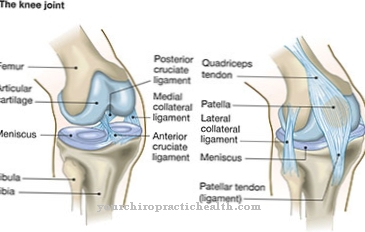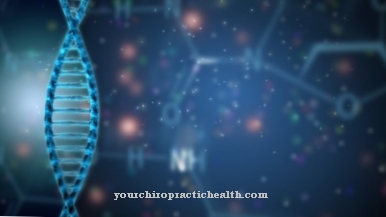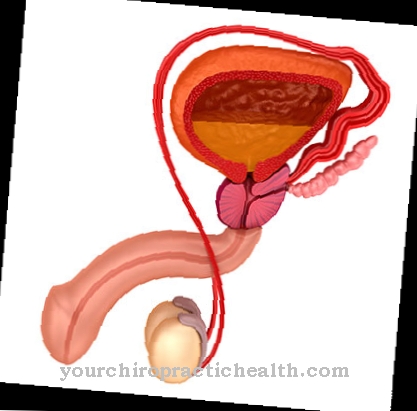From one colic in principle everyone can be affected, from babies to adults. It is not always necessary to consult a doctor, but the general condition can be significantly improved. Since the causes of pain can be very different, a medical examination makes sense. This essay shows the underlying causes of colic, what the course of the disease is, when it is essential to see a doctor, what everyone can do themselves for prevention.
What is colic?

© VadimGuzhva - stock.adobe.com
According to the dictionary, colic is an "attack of cramp-like abdominal pain". This pain is not only caused by movement, but can exist even when the body is at rest. Colic can occur when severe, labor-like and cramp-like pain occurs in the abdomen. Affected people also explain that almost pain-free phases alternate with acute pain phases. Therefore there is a further definition of "wave-like pain".
These colic are triggered by spasmodic muscle contractions in a hollow organ. The gall bladder, intestines and kidneys are among the hollow organs typically affected. Therefore, the particular colic is determined by the affected organ, such as B. biliary colic, intestinal colic or renal colic. In rare cases, the uterus or stomach can also be affected by colic.
As mentioned earlier, infants can also suffer from colic. The so-called "three-month colic" occurs most frequently with them. The name is derived from the phase of life and not from the organ that emanates from the pain. Infants can be particularly susceptible to this until they are three months old.
causes
The cause of colic depends on which hollow organ is affected. With biliary colic, gallstones are the cause of the symptoms. These "stones" prevent the normal function of the bile to produce and release bile. Food that is too fatty is the number one cause of biliary colic. In order to be able to digest fatty food, the body needs a lot of bile. If the bile goes into production, so to speak, existing gallstones are now easily flushed into the individual bile ducts. This leads to a blockage of the bile ducts and the resulting painful symptoms.
Intestinal colic can have different causes. On the one hand, flatulence, tumors or foreign bodies can narrow the intestinal passage. On the other hand, an existing disease of the intestine can be the cause and cause severe pain.
Renal colic occurs when kidney stones are flushed into the ureters and block them. The affected organ wants to remove the disorder (gall or kidney stones) by contracting. This creates the strong, cramp-like pain.
Symptoms, ailments & signs
Nausea and vomiting are clear signs of colic. It is still accompanied by severe and sudden abdominal pain. Depending on the type of colic, symptoms such as diarrhea and blood in the stool or blood in the urine appear. The duration of a colic is also very different. It can be limited to a few minutes, but can last up to hours.
For example, if there is biliary colic, the affected person suffers from pain pains in the upper abdomen. If the colic is very severe, the severe pain radiates to the back and vomiting and diarrhea are the result. A darker color of the urine or stool than usual is another consequence of this.
If there is renal colic, those affected complain of severe pain in the lower abdomen up to and including the bladder. Blood in the urine is also a typical feature of this colic, as the kidney stones injure the ureter internally. Other symptoms are nausea and vomiting.
Intestinal colic often causes the most severe symptoms. Pain often extends all over the abdomen. In addition to nausea and vomiting, the symptoms also include palpitations or sweats. Because of this, it is recommended to seek medical attention for quick relief.
Complications
If colic is quickly recognized as this, effective treatment can be provided. Therefore, further complications rarely arise in such cases. However, if colic is not treated, the underlying disease can progress. That means more complaints for the person concerned.
Stay z. If gallstones are left untreated, the normal function of the bile can be disturbed and damaged. If the cause of the complaint is a carcinoma, further complications are rarely inevitable. Food intolerance, jaundice and even reduced life expectancy are the result if treatment is not taken.
The colloquial "kidney stones" can also lead to complications if they are left untreated. For one, the ureter can be injured internally. On the other hand, urinary congestion can occur. This can cause kidney disorder or, in the worst case, kidney infarction.
Intestinal colic can also be life-threatening if an intestinal obstruction occurs. Further complications can arise from high blood pressure or a racing heart.
When antibiotics and painkillers are used to treat colic, these drugs can also cause dysfunction in the entire organism. If surgery is inevitable, there are other risks, such as: B. wound healing disorders, intolerance to anesthesia, inflammation, etc.
When should you go to the doctor?
If severe pain occurs in the middle and upper abdomen on the right side, a doctor should be consulted. If symptoms persist over a longer period of time, these should also be examined by a doctor. If symptoms increase quickly and are accompanied by other symptoms typical of colic, an emergency doctor should be called.
If symptoms of blood poisoning or an intestinal obstruction become apparent, action must be taken quickly and an emergency doctor called. Otherwise the situation can end in a life-threatening manner. If those affected still develop chills, fever or high blood pressure, the cause must also be examined and treated by a doctor. Acting quickly in such cases can actually save lives!
diagnosis
The attending physician will take a medical history to confirm colic or to rule out other diseases of the internal organs. To do this, the abdomen is first palpated.
The abdomen is then examined using ultrasound or colloquially using ultrasound. With this examination, kidney or gallstones can be clearly identified. If a clear diagnosis is not yet possible, magnetic resonance imaging or computed tomography can be used.
To diagnose renal colic, the urine is also examined. If it is necessary to subject the ureters to an examination, an X-ray examination including a contrast agent is essential.
If intestinal colic is suspected, X-rays or ultrasound examinations are carried out to get to the bottom of the cause. In rare cases, an endoscopy (colonoscopy) is done.
Treatment & Therapy
Heat is helpful to relieve existing cramps. In addition, gentle exercise can help make the pain tolerable. Anyone who suffers from renal colic should drink as much lukewarm tea as possible. Chamomile or fennel tea are ideal for this. These also have an antispasmodic effect and flush the urinary tract thoroughly. In the case of acute and severe pain, the use of pain relievers is unavoidable. Then the cause of the complaint can be accepted.
Treatment for gallstones or kidney stones consists in breaking them up. When this happens, they are eliminated through the urinary tract. If gallstones keep re-forming, it may be necessary to remove the gallbladder.
The treatment of intestinal colic includes the use of gas-reducing drugs as well as the administration of relaxing painkillers. Antibiotics are also prescribed in certain cases.
Dietary changes are highly recommended for people prone to intestinal colic. In mild cases, this will bring relief. Home remedies, such as warm baths or fennel tea, can also improve the symptoms of mild illnesses.
However, if an intestinal blockage is the cause of colic, surgery is necessary.
Outlook & forecast
In most cases, colic can be treated medically and cured. After a short time, pain and cramps subside and the general condition improves. If the treatment goes well, nothing stands in the way of a favorable prognosis. Most of those affected are symptom-free after just a few weeks.
If the cause is directly organic, a favorable outlook must also be certified. Many therapy methods are successful and can therefore also predict a complete healing.
If a disease of chronic origin is the basic problem, there is usually no complete cure. Colic will recur, which will not allow a full recovery. However, in such cases, measures can be taken to alleviate the symptoms.
In addition, psychotherapeutic treatments can help to accept the illness and not to declare it as an "enemy". A balanced psyche will greatly improve your overall health. If no treatment options are considered, life-threatening consequences can occur with no prospect of a cure.
prevention
To prevent colic, the abdomen and kidneys should be kept warm. In addition, the most susceptible organs are well flushed through sufficient fluid intake. If you have repeated complaints, for example with the gall bladder, you should consider having it removed. Of course, this is a surgical procedure, but prevents further biliary colic. Furthermore, a healthy lifestyle and a varied diet are recommended to prevent colic of any kind. Anyone who may belong to risk groups due to hereditary factors should adhere to the proposed therapeutic measures.
Aftercare
Whether and in what form follow-up care is necessary for colic depends entirely on the causes. If obstacles - such as a blockage of the intestine or kidney stones - were the cause, there is no follow-up care. If further pain occurs after removing the obstacle, the affected organs may need to be examined using imaging techniques. Sometimes it can lead to damage, in the worst case to perforations.
If, for example, inflammatory processes were the reason for the colic, follow-up care consists of taking care of the patient after treatment. For chronic diseases associated with colic, follow-up care consists of occasional examinations. Changes in the clinical picture, which may also lead to relapses in pain, can be found in this way.
However, in many cases there is no causal therapy and the colic therefore continues to occur. At best, follow-up care consists of an adapted diet (for intestinal disorders) and examining the organs in the event of particularly severe pain attacks. Sometimes colic is so severe that rest is recommended as follow-up care. Sufferers should avoid physical exertion for some time and keep their bodies warm. However, this type of follow-up does not necessarily mean that the condition will improve.
You can do that yourself
Everyone is responsible for their own lifestyle. Regardless of whether someone belongs to an affected risk group or not, a healthy lifestyle should be observed. This includes good quality food, avoidance of stress, and sufficient exercise and rest periods.
In addition, regular appointments should be made with the family doctor or he should be consulted if there are complaints. Specialist appointments with a gastroenterologist or similar can also be considered.
If symptoms are severe and persistent, medical advice must be sought immediately in order to avoid life-threatening complications.
Of course, these tips are not a guarantee that you will never get colic. However, they help to keep the risk of illness to a minimum.

.jpg)
.jpg)

.jpg)



















.jpg)



